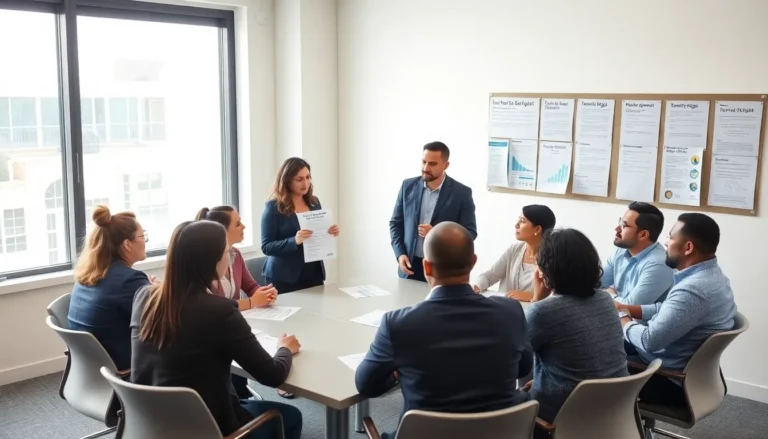Buying a first home is an exciting yet daunting milestone for many. With so many options and decisions to make, it can feel overwhelming. Navigating the real estate market for the first time requires knowledge and confidence, but the rewards of homeownership are well worth the effort.
For first-time home buyers, understanding the process is crucial. From securing financing to choosing the right neighborhood, each step plays a vital role in finding the perfect home. With the right guidance, they can turn uncertainty into empowerment, making informed choices that align with their dreams and financial goals. This article will explore essential tips and insights to help first-time buyers embark on their journey with confidence.
Table of Contents
ToggleUnderstanding the First-Time Home Buyer
First-time home buyers encounter unique situations in the real estate market. Understanding these characteristics and challenges helps navigate the buying process effectively.
Definition and Characteristics
First-time home buyers typically refer to individuals or families purchasing a home for the first time. Key characteristics include:
- Inexperienced: Lack of familiarity with real estate transactions and options.
- Financial Awareness: Limited knowledge regarding mortgages, down payments, and homeownership costs.
- Budget-Conscious: Focused on affordability, often requiring lower-priced homes or assistance programs.
- Emotional Investment: Strong attachment to the home search process, balancing dreams with practical considerations.
Common Challenges
First-time home buyers face various obstacles during the home buying journey. Common challenges include:
- Financing Issues: Difficulty securing a mortgage due to credit score requirements, down payment savings, or debt-to-income ratios.
- Market Competition: Stiff competition with seasoned buyers makes it hard to secure desirable properties.
- Understanding Contracts: Confusion over legal documents and terms can lead to costly mistakes.
- Neighborhood Selection: Uncertainty about the best neighborhoods based on factors like school quality, safety, and amenities.
By recognizing these characteristics and challenges, first-time home buyers can better prepare for a successful home buying experience.
Preparing to Buy Your First Home

Preparing to buy a home involves critical steps that ensure readiness in both financial and emotional aspects. First-time home buyers can streamline this process by focusing on key evaluations and creating a structured budget.
Assessing Your Financial Readiness
Assessing financial readiness remains essential for first-time home buyers. They must review credit scores, as a score of 620 or higher generally benefits mortgage applications. It’s advisable to gather financial documents such as W-2 forms, bank statements, and tax returns. Many buyers find it helpful to consult lenders early on. This step provides clarity on pre-approval amounts and interest rates, guiding decision-making effectively.
Understanding debt-to-income ratios also plays a crucial role. A ratio below 43% often enhances loan approval chances. Saving for a down payment, ideally between 3% to 20% of the home’s price, offers additional security. Establishing an emergency fund for unexpected costs during and after the purchase further strengthens financial readiness.
Setting a Realistic Budget
Setting a realistic budget significantly impacts the home buying journey. First-time buyers should consider all associated costs, not just the mortgage payment. Identifying monthly expenses, including property taxes, insurance, and maintenance, is vital for accurate budgeting.
Creating a comprehensive budget requires research on local market prices. Buyers often explore homes in various neighborhoods to find affordable options. Using online mortgage calculators helps determine potential monthly payments based on interest rates and loan amounts.
Additionally, first-time buyers can set aside a percentage for closing costs, which typically range from 2% to 5% of the loan amount. By calculating these aspects, they can select a price point that aligns with their financial capabilities and long-term goals.
Navigating the Home Buying Process
First-time home buyers face multiple steps when purchasing a home. Understanding these steps enhances their confidence and clarity throughout the journey.
Finding a Real Estate Agent
Finding a real estate agent involves selecting a knowledgeable and experienced professional. Buyers should consider agents who specialize in the local market and possess a strong track record. Referrals from friends or family and online reviews provide valuable insights. Buyers should also interview multiple agents to assess compatibility and communication styles. It’s essential that the chosen agent understands the specific needs and budget of the buyer, ensuring a tailored approach throughout the buying process.
Exploring Mortgage Options
Exploring mortgage options requires an understanding of different financing tools available for first-time buyers. Buyers can choose from fixed-rate mortgages, adjustable-rate mortgages, and government-backed options such as FHA loans. Each type has distinct benefits and limitations. Comparing interest rates and terms from various lenders enhances the likelihood of finding favorable conditions. Consulting with lenders can also clarify the intricacies of loan products, fees, and requirements. Buyers should gather necessary documents like income verification and employment history to expedite the pre-approval process.
Closing the Deal
Closing the deal on a home purchase involves several critical steps, particularly regarding closing costs and preparations for closing day. First-time home buyers must understand these elements to ensure a smooth transaction.
Understanding Closing Costs
Closing costs encompass various fees associated with finalizing a real estate transaction. These costs typically range from 2% to 5% of the loan amount. Key components of closing costs include:
- Loan Origination Fees: Charged by lenders for processing the loan application.
- Appraisal Fees: Assessments to determine the property’s market value.
- Title Insurance: Protects against potential legal issues with ownership.
- Escrow Fees: Covers the costs of the escrow service that manages the closing funds.
- Inspection Fees: Costs for home inspections to identify potential repairs.
- Prepaid Costs: Payments for property taxes and homeowner’s insurance that may be due at closing.
First-time buyers should request a loan estimate to clearly outline all anticipated closing costs.
What to Expect on Closing Day
Closing day marks the final step in the home-buying process. It involves multiple critical tasks, including:
- Final Walkthrough: Buyers may conduct a walkthrough to ensure all agreed-upon repairs are completed and the property is in acceptable condition.
- Signing Documents: Buyers must sign several legal documents, including the mortgage note and closing disclosure.
- Fund Transfer: Buyers transfer the down payment and closing costs, usually via certified check or wire transfer.
- Receiving Keys: Once all documents are signed and funds are transferred, buyers receive the keys to their new home.
Buyers should arrive prepared with all necessary identification and any required documents to facilitate a seamless closing process.
Tips for First-Time Home Buyers
First-time home buyers can benefit from specific strategies to enhance their purchasing experience. The following tips focus on avoiding common mistakes and recognizing when to walk away from a deal.
Avoiding Common Mistakes
- Skipping Pre-Approval: Skipping this step can lead to disappointment. Secure a mortgage pre-approval to understand your budget and strengthen your offer.
- Ignoring Total Costs: Ignoring costs beyond the sale price may result in unpleasant surprises. Factor in property taxes, insurance, and maintenance to determine true affordability.
- Neglecting Home Inspections: Neglecting inspections can reveal unforeseen issues post-purchase. Always conduct a comprehensive home inspection to identify potential problems before finalizing the deal.
- Overextending the Budget: Overextending finances can jeopardize future stability. Stick to a budget that aligns with income and expenses to ensure long-term financial security.
- Not Researching Neighborhoods: Not researching prospective neighborhoods can lead to dissatisfaction. Investigate factors like crime rates, school quality, and local amenities to find a suitable area.
Knowing When to Walk Away
- Unreasonable Seller Demands: Unreasonable demands from the seller can indicate potential issues. If negotiations become excessively challenging, reconsider pursuing the property.
- Significant Repair Needs: Significant repair needs can strain finances and time. If inspection reports indicate major repairs, walking away may be prudent.
- Inability to Meet Financing Terms: Inability to secure favorable financing terms can make a purchase unfeasible. If interest rates or terms are unsatisfactory, it may be wise to continue the search.
- Market Overpricing: Market overpricing can lead to a poor investment. If a property seems overpriced compared to others in the area, walking away is a reasonable choice.
- Emotional Attachment Risk: Emotional attachment can cloud judgment. If feelings about a property overshadow rational decision-making, taking a step back can allow for clearer thinking.
Embarking on the journey of buying a first home can be both exhilarating and daunting. With the right preparation and knowledge, first-time buyers can navigate the complexities of the real estate market with confidence. Understanding financial readiness and being aware of common pitfalls are crucial steps in making informed decisions.
By leveraging resources and seeking guidance from experienced professionals, they can turn their dream of homeownership into a reality. Each step taken—from securing financing to closing the deal—brings them closer to creating a space that truly feels like home. With determination and the right tools, first-time buyers can successfully overcome challenges and embrace the rewarding experience of homeownership.




